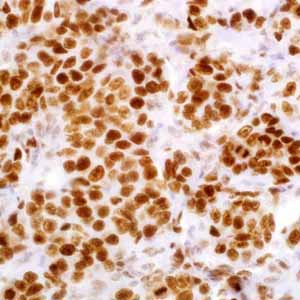
EZH2 (11)

Enhancer of zeste homolog 2 (EZH2) is the catalytic subunit of polycomb repressive complex 2 (PRC2). It generates a methylation epigenetic mark at lysine 27 residue of histone H3 (H3K27me3) in order to silence gene expression.1 EZH2 target genes are involved in a variety of biological processes such as stem cell pluripotency, cell proliferation, and oncogenic transformation. 1 EZH2 is frequently overexpressed in many cancer types.1-2 Hyperactivation of EZH2, either by overexpression or mutations, is found in a variety of malignancies including prostate, breast, uterine, gastric, and renal cell cancers in addition to melanoma.3-4 EZH2 overexpression has been reported in non-small cell lung cancers and lymphoma.1 The EZH2 protein is rarely detected in normal breast duct epithelium and in normal and hyperplastic lymph node. EZH2 is usually expressed in follicular centers, but not in mantle zones, follicular and interfollicular T cells, plasma cells or NK/T cells. However, its expression can be seen in most B-cell and T-cell lymphomas, although only in 20% (1/5) of small lymphocytic lymphoma and 14% (1/7) of plasma cell myeloma. Plasmacytoma, lymphoplasmacytic lymphoma, and MALT lymphoma have not been shown to express this protein.2 Recent studies also have demonstrated EZH2 is aberrantly over-expressed in pediatric rhabdomyosarcoma, independent of the histological subtypes.1 In summary, EZH2 correlates with tumor proliferation and may be used in an antibody panel to differentiate proliferative/aggressive lymphoma variants from indolent ones and normal resting cell populations.
